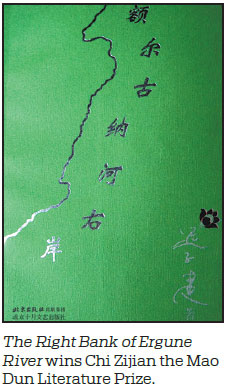"Improvement of infrastructure, like transportation, is only a part of the work," she says. "Revitalization of culture in these border areas is also crucial. Relevant studies need to be enhanced through multiple ways, such as archaeology, to fully showcase their charm."
Such revitalization will get people's spirits up and the economic boom will come naturally, she adds.

She has set an example: Her poetic description of the village in the Fairy Tales of the Arctic Pole Village has turned the northern outpost into a popular and top tourism destination.
Chi says border areas also witness much communication with foreign countries.
"Russia is just across the river from my hometown," the writer says, smiling. "In our dialect, we call a kind of water bucket vedero, a Russian word."
Unique cultures develop through such interactions, she continues.
"Frontier ports not only serve for business or trade, but also help with people-to-people exchanges."
In Heihe, another city in Heilongjiang along China's border with Russia, for instance, Chi cites a 9-year-old cultural festival that has enabled Chinese and Russian art troupes and writers to regularly communicate with each other. "It is a brilliant idea to have a fair of culture."
Intentionally or not, Chi's books have become bridges for such cross-border communication, too. Her books have been translated into English, French, Japanese, Italian, Spanish, Korean and some other languages. Last year, the Swedish edition of The Right Bank of Ergune River was published.
Nevertheless, Chi plays down her growing global recognition.
While traditional Chinese values need to be better showcased, Chi says, "going abroad shouldn't be done in a haste".
"Overseas publishers have their own criteria for selection. Artistic merit - not fame and profit - should be a writer's primary concern."